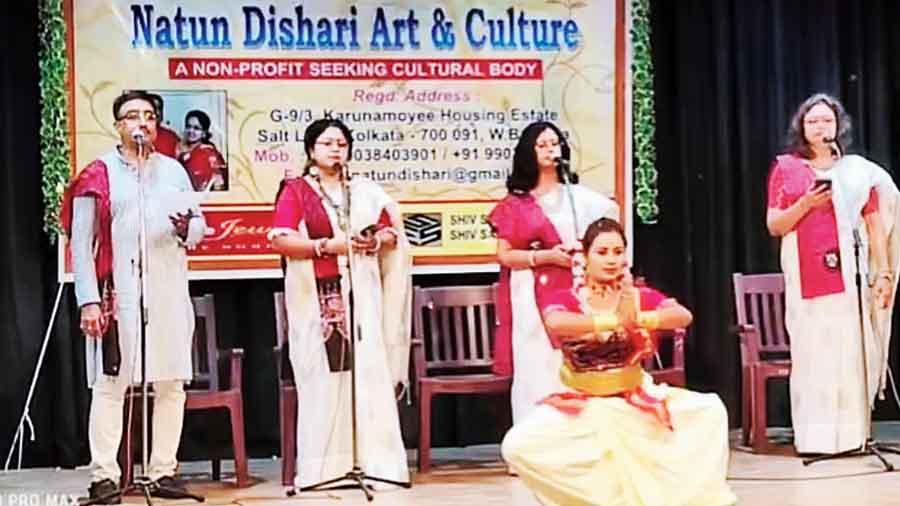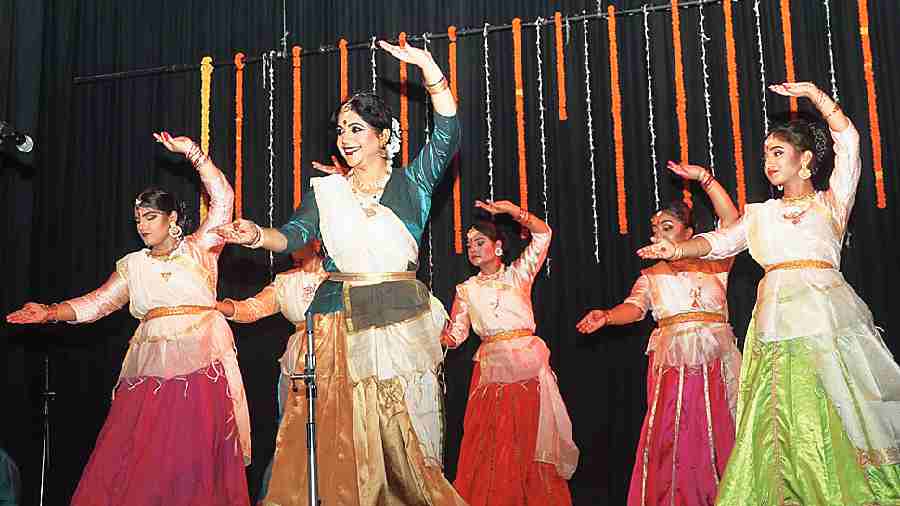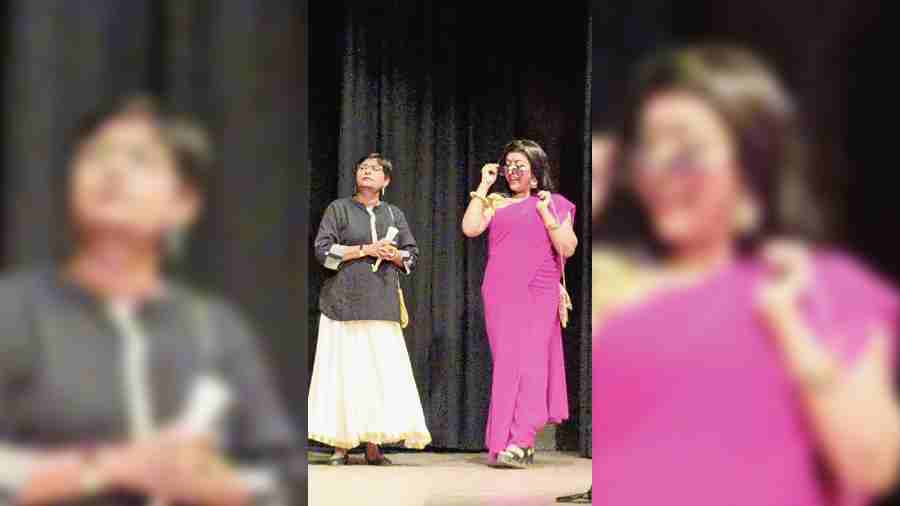Salt Lake-based socio-cultural group Boichitro was back on stage with a live show at Rabindra Okakura Bhavan after a gap of two years.
The satisfaction was evident in the welcome address of president Sushmita Sensharma. “Boichitra,” she mentioned, had “attained adolescence” by completing 11 years. “We are happy to perform before a live audience though even during the pandemic our members had continued their cultural activities over digital platforms.”
The curtains parted to the rendition of a Rabindranath Tagore number in chorus, Morey aaro aaro aaro dao pran. Then there was a presentation based on Tagore’s poem Samanyo Kshoti. Children of Boichitro members, who had scored 80 per cent and above in Board examinations between 2019 and 2022, were felicitated by Sujit Chakraborty, former director of the Geological Survey of India, and his wife Rina, residents of IA Block.
A comedy, written by Tagore in 1901, titled Sukkho Bichar, was enacted by Rishiraj Ghosh and Niladri Mondal. “Due to time constraints, we rehearsed late in the evening in the office of IA Market, after our shops shut,” said Rishiraj, who runs a dashakarma bhandar. He had acted earlier in Tagore's play Khyatir Birambona at IA Market, along with other shopkeepers. “That was in 2020,” he said, adding that the director was Jishu Bhatta, who was directing this production as well. Niladri, his brother-in-law, was putting up his first public performance with Sukkho Bichar. “I was hesitant but Jishu sir persuaded me. It was an audio play so I could practise on my own.”
Jayati Biswas and Smritikamal Biswas presented a part of the play Siraj ud Doulla, featuring an emotional conversation between Nawab Siraj ud Doulla and his lady love Aleya the night before the battle of Plassey, as audio drama. An excerpt from Dwijendralal Roy's play Shahjahan was also performed, where Dildar warns Shahjahan that an autocrat's apparent rise is a precursor to his downfall. The short play was staged by Parthapratim Mitra and Utpal Samanta.
Another excerpt staged was from the play Alibaba, where Marjina approaches Baba Mustafa to stitch the quartered body of Casem who was murdered inside the cave. The scene earned repeated rounds of applause. Soumya Dasgupta, who played Baba Mustafa, said: “I started acting in 2011, when Boichitro staged its first show. I was a theatre-lover. Never did I think that I would be on stage myself.” Kasturi Basu, a civil engineer, played Marjina. “This character has many shades, so it needed practice. The inputs for improvisation from our director helped,” she said.
One of the participants in Samanyo Kshoti, associated with Boichitro since inception, Sreemati Mukherjee, who teaches at Lady Brabourne College, said: “Boichitro gives us the opportunity to interact with people from different age groups and inculcate qualities like cooperation, coordination, sharing stage and other socialising skills.”
The concluding item was a comedy, Bhayonkar Bharate, directed by Jishu Bhatta, based on the Narayan Gangopadhyay story Bharate Chai.
“Boichitro is not merely a socio-cultural group. It's an extended family and my aim is to guide the next generation ahead,” said Bhatta, the director.
Bharati Kanjilal
Audio play fest

A performance by members of Natun Dishari
A clutch of thought-provoking audio plays was presented by nine groups from across Calcutta and the districts at Rabindra Okakura Bhavan recently when Karunamoyee-based cultural group Natun Dishari Art & Culture organised a programme titled Srutisandhya.
At the start, writers Prithwiraj Sen and Sushmeli Dutta, physician and theatre personality Basudeb Mukherjee, and writer and theatre personality Subhashis Ghosh Thakur were felicitated by the husband-wife duo Parthapratim and Sanjana Seal, on behalf of Natun Dishari. This was followed by a collage of song, dance and recitation. Dutta recited two self-composed poems, including one in tribute to Sunil Gangopadhyay.
The second phase featured audio plays by each of the nine groups. The Natun Dishari production Tritiya Nayan, written by Dutta and enacted by the Seals, was based on the relationship of a married couple. On her birthday she realised that her husband's priority in life was his career and his love for her was a eyewash. “The birthday celebration is symbolic. The story celebrates emancipation of women,” Dutta said.
Another play Barnaporichay, a solo presentation by Nandini Laha, was about an educated girl falling in love with an illiterate son of a peasant. Villagers blamed the girl since she could not give birth even after five years of marriage, but her father-in-law respects her since she is educated and asks her to teach him Barnaporichoy. But the villagers and his son take it otherwise and torture him to death while he was taking a lesson. On his death bed, he asks his daughter-in- law to enlighten his illiterate son. “This story is a tribute to Iswarchandra Vidyasagar, who gave us Barnaporichay,” said Nandi.
North Calcutta-based group Sanglap's romantic play Bagh revolved around an exchange of letters between two friends when the girl's cellphone gets damaged. “With the fast pace of life and development of technology, writing letters is almost obsolete now. I want to rekindle those memories and revive the practice,” said Subhashis Ghosh Thakur of Sanglap.
There was applause for powerful acting in Parichay. Alap's production was a story of infatuation germinating between a college girl and a boy she met in Missouri.
Amrita Manthan, by Agarpara group Kathamala, was on a woman being exploited by her husband, who aborted every pregnancy with medicine just so he could sell her breast milk. “Women’s exploitation is rampant in our country, especially in under-developed areas,” said Soma Saha , who played the lead. The programme was compered by Nandini Laha.
“Cultural activities, especially theatre festivals, usually remain confined to the Academy of Fine Arts-Rabindra Sadan complex, so organising such an event in Salt Lake is a great achievement. I received overwhelming response,” said Parthapratim Seal.
Bharati Kanjilal
Dance day

A moment from the Nrityam show
DA Block-based kathak institute Nrityam presented its annual day with students ranging from preschool-going age to even mothers of other students.
The youngest student was Pratyusha Roy of kindergarten. “She is so little and new that in class, if the doorbell rings, she gets distracted and runs to check who it is!” laughed their teacher Puloma Sen. “We couldn’t risk this on stage so we got her to light our inaugural lamp instead. Arshiya Aich and Esha Dutta, in Class IV, were the youngest to dance. Esha's mother Sabitri Chakraborty, and Manisha Basu, were among the senior most on stage.
“We had been doing offline classes as and when possible throughout the pandemic and the students were very eager and enthusiastic about this show. All would turn up punctually for practices and were sincere in class. I would have held this show later but senior students like Shirin Anwar and Rishika Saha took charge and made this happen,” said Sen.
Rishika spelt out why this show was the most special in the eight years that she has trained at Nrityam. “We had lost the habit of dancing on stage. So getting it right for this concert was a big deal for us. We put in more effort as we were nervous,” said Saha, a third year BBA student at Amity University, who stays in GD Block.
Sen's own daughter Aryama could not dance this year as she has joined IIM Joka. But she did her bit by stitching together Bratati Bandyopadhyay's recitation of Tagore's Prithibi with relevant songs by different artistes that the dancers performed to. All students took part in this segment.
Students also performed kathak with some of them reciting the bols as well as dancing. There was a solo portion by Sen.
Parents were seen running around doing legwork too. Paramita Mukherjee, mother of Nayva, for instance, had anchoring duty.
A segment was also reserved for dancers from Aguntuk, an institute for the specially-abled in Santoshpur. A donation box for them was laid out and guests donated Rs 8,500 on the spot that was handed over to them.
